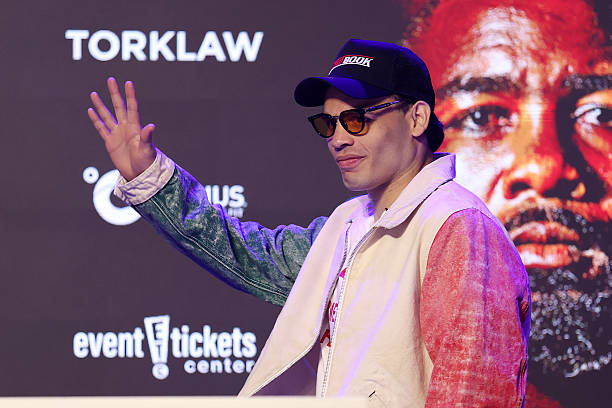1. A Knockout Outside the Ring: Arrest in Los Angeles
On July 2, 2025, just days after a high-profile loss to YouTube-star-turned-boxer Jake Paul, former WBC middleweight world champion Julio César Chávez Jr. was taken into custody by U.S. Immigration and Customs Enforcement (ICE) officers in Los Angeles. The arrest was not related to the bout’s outcome, but rather to two federal violations:
-
Overstaying a tourist visa that expired in February 2024
-
Lying on a green-card application submitted in April 2024, in which he claimed eligibility through marriage to a U.S. citizen
These seemingly routine immigration infractions quickly snowballed into an international incident.
2. The Deportation Flight: From L.A. to Sonora
Less than seven weeks after his arrest, Chávez Jr. was deported to Mexico. Speaking at her morning news conference on Tuesday, August 19, 2025, Mexican President Claudia Sheinbaum confirmed:
“I understand he was deported. I don’t know if it was yesterday or this morning. But they told us he will come to Mexico.”
Upon arrival, federal agents transferred the boxer to Policía Federal facilities and then to Centro de Readaptación Social (CERESO) in the northern state of Sonora, a prison known for housing high-profile organized-crime suspects.
3. A Wanted Man: The Mexican Warrant and Cartel Allegations
Chávez Jr. did not walk free on Mexican soil. Instead, he was immediately served a Mexican federal arrest warrant for:
-
Arms trafficking
-
Drug trafficking
-
Membership in and collaboration with the Sinaloa Cartel
According to Mexico’s Attorney General Alejandro Gertz Manero, the investigation began in 2019, long before the visa overstay. Wiretaps, financial records, and testimony allegedly link the boxer to logistics and money-laundering operations for the cartel. Investigators claim he used his celebrity status and international travel schedule to ferry bulk cash and coordinate weapon deliveries.
4. The Green-Card Marriage Under Scrutiny
Central to the U.S. immigration case is Chávez Jr.’s April 2024 application for Lawful Permanent Resident status based on marriage to a U.S. citizen. Department of Homeland Security (DHS) officials state that:
-
The marriage itself is under fraud review
-
The spouse has prior romantic ties to Edgar Guzmán López, deceased son of Joaquín “El Chapo” Guzmán, whom the U.S. designates as a Foreign Terrorist Organization leader
-
These ties allegedly make the spouse a national-security risk, invalidating any derivative visa claim
5. A Troubled Timeline: Previous Run-ins With the Law
Chávez Jr.’s legal issues in the United States did not begin in 2024. Court records show:
-
2012 – DUI Conviction: After a Los Angeles traffic stop, he was sentenced to 13 days in jail and alcohol-education classes.
-
January 2024 – Gun Arrest: LAPD officers allegedly discovered two AR-style ghost rifles (unserialized, untraceable) during a search of his California residence. The case remains open in Los Angeles Superior Court.
6. Family Legacy in the Spotlight
The scandal reverberates beyond the fighter himself. His father, Julio César Chávez Sr., is a three-division world champion and Mexican national icon. The elder Chávez has not yet issued a formal statement, but associates told ESPN Deportes he is “devastated” and has hired a legal team in both Mexico and the United States to assist his son.
Frequently Asked Questions (FAQ)
Q1. Why was Chávez Jr. deported so quickly?
A. Immigration courts moved on an expedited removal track because he overstayed a visa and falsified a federal form. With a valid Mexican warrant waiting, ICE coordinated a stipulated removal, waiving his right to a full hearing in exchange for immediate deportation.
Q2. Can he fight extradition back to the U.S.?
A. He is no longer in U.S. custody, so extradition is not pending. However, if U.S. prosecutors file new charges (e.g., gun trafficking), they could request extradition after Mexican cases conclude.
Q3. What prison conditions does he face in Sonora?
A. CERESO Sonora is medium-security, but a special wing houses cartel suspects. Reports describe overcrowded cells, limited outdoor time, and heightened surveillance to prevent escape or attack.
Q4. Is his boxing career over?
A. Likely yes. The World Boxing Council (WBC) has suspended his license, and no major promoter will schedule bouts while he faces organized-crime charges. Even if acquitted, visa ineligibility bars him from fighting in the lucrative U.S. market.
Q5. How long could he be jailed in Mexico?
A. Arms and drug-trafficking sentences in Mexico can range from 10 to 25 years. With additional counts for cartel association, prosecutors may seek the maximum. A trial date is expected within 90 days.
7. The Bigger Picture: Sports, Crime, and Diplomacy
The case highlights the intersection of sports celebrity and transnational crime. U.S. officials hope it will deter other athletes from laundering money or transporting contraband under the cover of fame. Meanwhile, Mexican authorities view the arrest as proof of cooperation with Washington after years of tense relations over drug-war strategy.
For Julio César Chávez Jr., the path from boxing champion to prison inmate is a cautionary tale of squandered talent, questionable alliances, and the high price of living in two worlds—one of championship belts and bright lights, the other of handcuffs and prison bars.

